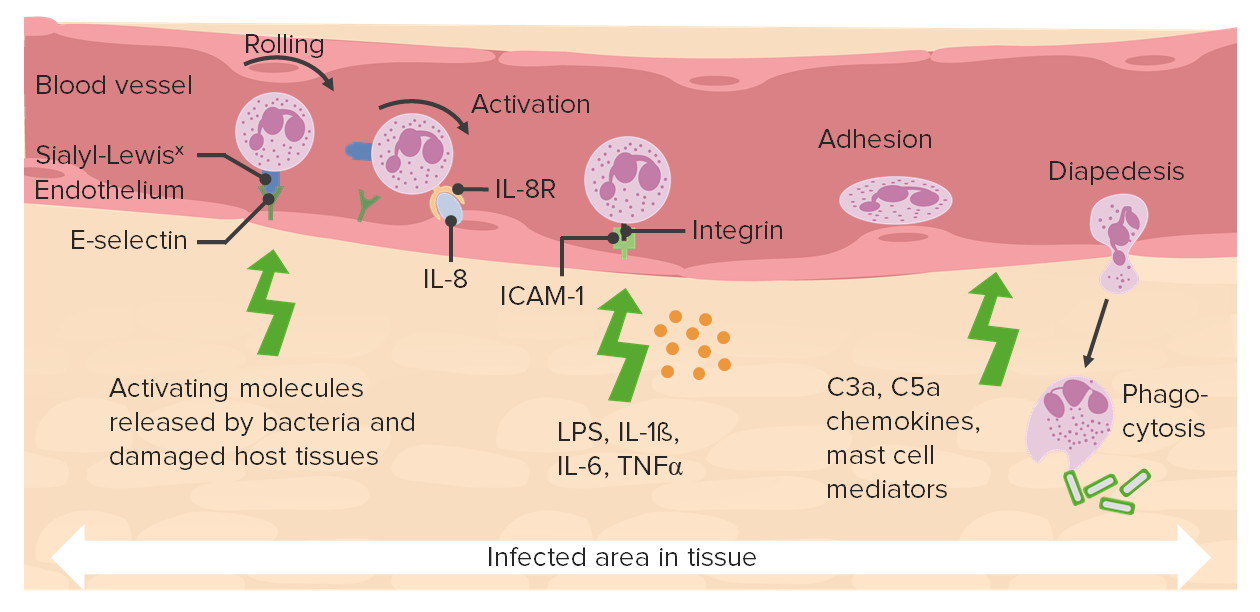Playlist
Show Playlist
Hide Playlist
Resolution of Acute Inflammation
-
Slides Acute and Chronic Inflammation Moderate Acute Inflammation.pdf
-
Download Lecture Overview
00:01 How do we resolve the acute inflammatory process? Well, we have to inactivate all the mediators. 00:07 Fortunately, many of these are very short lived, although they're very potent, and can cause a lot of damage most spontaneously will decay. 00:16 So the eicosanoids that we talked about those molecules that come from arachidonic acid, tend to fall apart relatively quickly. 00:23 Nitric oxide also tends to fall apart relatively quickly. 00:27 So there's spontaneous decay. 00:30 We are releasing into the space, a lot of proteases. 00:34 And those will catabolize or break down enzymes and other proteins. 00:39 So we will have kind of a major debris field as we chew up everything in that area. 00:45 And that will also inactivate many of the mediators. 00:49 We have a number of scavengers for oxygen free radicals. 00:52 Remember, oxygen free radicals? Reactive Oxygen Species, or ROS are going to be really important in terms of cleaning up and sterilizing the area of injury. 01:04 We have to scavenge those, and we have a number of molecules that will do that. 01:10 We have inhibitors. 01:11 This is one of those paradigms that we've talked about. 01:13 Every time you have something that's pro inflammatory, such as complement, you have actually anti inflammatory pathways that will inhibit. 01:20 So we are also elaborating those in this timeframe. 01:25 And we will make counter regulatory molecules. 01:28 So remember, even as we're making pro inflammatory prostaglandins and leukotrienes from those arachidonic acid metabolites, on the other hand, we're also making anti-inflammatory lipoxins. 01:41 So this is going to be how we inactivate many of the mediators, or fine tune them to turn down all of the inflammation coming from the neutrophils. 01:53 The other thing is that we're going to stop recruiting those neutrophils. 01:56 We are going to change the endothelium. 01:58 It's not going to be sticky anymore, specifically for neutrophils. 02:03 And the neutrophils that have crawled across, they're very short lived. 02:06 Within 10 hours, they undergoes cellular suicide. 02:11 It's actually kind of interesting. There are some disease states where the neutrophils live two to three hours longer than they're supposed to. 02:18 And those patients, every time they get a little bit of an infection or a little bit of an injury, have a very aggressive inflammatory response and actually get more tissue necrosis. 02:28 So we count on the neutrophils killing themselves after about 10 hours after they crawl out of the blood vessels. 02:35 Were also one of the other mechanisms for modulating acute inflammation is to modulate the receptor expression or signal transduction of many of the cells in the area. 02:46 So mast cells, fibroblasts, smooth muscle cells, everything that's in the area. 02:52 As they have been stimulated once they tend to internally counter regulate and turn down the receptors so they're not as susceptible to signaling as they were previously. 03:02 So there are many ways that we can moderate resolve the acute inflammation.
About the Lecture
The lecture Resolution of Acute Inflammation by Richard Mitchell, MD, PhD is from the course Acute and Chronic Inflammation.
Included Quiz Questions
Which of the following has anti-inflammatory properties?
- Lipoxins
- Eicosanoids
- Complements
- Free radicals
- Nitric oxide
Which of the following is crucial to limit the undesirable consequences of the inflammatory process?
- Induction of neutrophilic apoptosis
- Increased generation of reactive oxygen species
- Recruitment of neutrophil and macrophages
- Upregulation of the complement cascade
- Increased blood flow and vascular permeability
Customer reviews
5,0 of 5 stars
| 5 Stars |
|
5 |
| 4 Stars |
|
0 |
| 3 Stars |
|
0 |
| 2 Stars |
|
0 |
| 1 Star |
|
0 |




